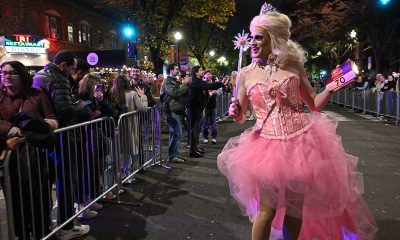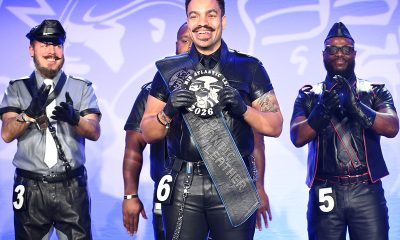Arts & Entertainment
Actress Katherine MacGregor remembered as ‘Little House’ villain Harriet Oleson
Larger-than-life grand dame of Walnut Grove showed depth on rare occasions
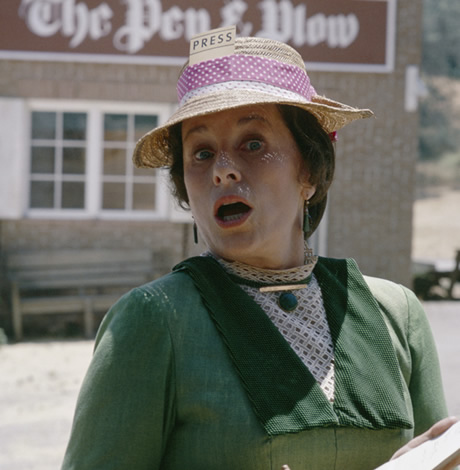
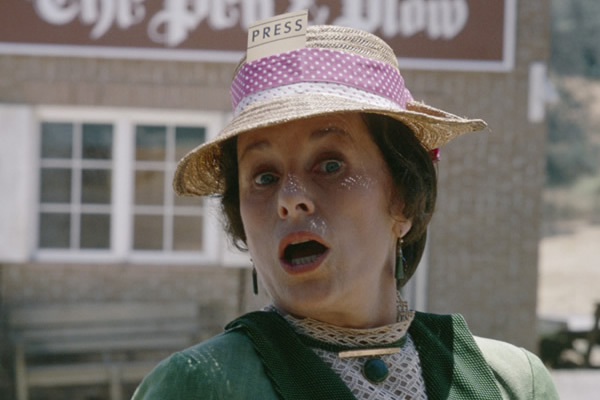
Katherine MacGregor as Mrs. Oleson, the villain fans loved to hate on ‘Little House on the Prairie.’ (Photo courtesy NBC)
When actress Alison Arngrim, best known as Nellie Oleson on “Little House on the Prairie” (1974-1983) came to Washington to do a book signing at (where else?) Nellie’s Sports Bar in 2011, I went to meet her and interviewed her for the Blade in advance of her appearance.
She was everything I’d hoped for and more. “Little House” was one of my favorite childhood TV shows and the outrageous Oleson family — father Nells (Richard Bull), mother Harriet (Katherine MacGregor), daughter Nellie and son Willie (Jonathan Gilbert; real-life brother to series star Melissa Gilbert) — were my favorites. The Ingalls family the show was centered on were just too loving, sickening and saccharine for me, even as a kid. The Olesons brought comedy relief, bitchiness and flair to the show — they were just the counterflavor the long-running series needed. You always knew which of the towns folk would be in any given “Little House” episode as they were credited only in the episodes in which they appeared after Mary, Laura and Carrie ran through the field (God, why did they never reshoot that opening over eight friggin’ years?). I always waited to eagerly to see if Harriet and Nellie would be in the episode at hand.
So it was with sadness but also happy memories that I heard last week that Katherine MacGregor died at age 93. Harriet and Nellie had places in the hearts of many gay men who love female villains. They’re cut from the same cloth as Pat Carroll’s Ursula, Margaret Hamilton’s Wicked Witch of the West, Glenn Close’s Marquise de Merteuil and scores of others. When my nieces and nephews were very young, they were baffled by my affinity for these types. It’s never been so much that they’re evil — they’re just so much more fabulous, larger than life and colorful than the anodyne protagonists.
Arngrim’s memoir “Confessions of a Prairie Bitch” is a hoot and should be required reading if you’re a “Little House” fan. We had such a fun time chatting for the Blade, I decided to see if I could track down MacGregor as well. I’d heard from Arngrim that MacGregor would sometimes do Oleson family sketches for fans and wanted to write to her and request one. I thought a hand-drawn sketch would be a fun “Little House” memento.
I got MacGregor’s Los Angeles address and packaged up a few sheets out of a sketch tablet, some black Sharpies, a nice stiff self-addressed and stamped return folder and a fan letter. I wanted to make it as easy as possible for Miss MacGregor so all she’d have to do would be open it up, draw her sketch, slip it in the mail and be done with it. I heard back from her a short time later. I did not get my sketch but what I got back was even better — a signed photo and a four-page (!) handwritten letter. I was flabbergasted that she would take the time to write at such length and her letter is priceless.
Initially, however, Miss MacGregor was not pleased. She found the large package I sent all this in cumbersome, unwieldy and difficult to open and sent my paper, pens and envelope back (hell, I wouldn’t have cared if she’d kept them).
“I do have a suggestion,” she wrote. “If you write to other celebrities, DO NOT send your request in such a gigantic envelope that fits NO mailbox at all!! And for me at any rate was almost impossible to open.” Naturally I heard Harriet’s voice in my head saying all this and felt dutifully chided. From this and other parts of her letter, you could just tell there was a lot of Harriet in Katherine — I’m not saying Katherine was a huge bitch in real life, but the easily exasperated, crusty exterior was there.
Arngrim would say as much in her book as well. Melissa Gilbert wrote on Instagram of how “loving and nurturing she was with the younger cast.” A funny snapshot of the real Katherine is her appearance on a heroes vs. villains episode of “Family Feud” from the early ‘80s. It’s on DVD and gives you a feel for how she carried herself out of character.
The crux of the letter itself, however, was warm. She reminisced about “Little House” cast members who’d died, sent me a picture of her dog, told me about her aches and pains and shared a vaguely cryptic note I was left to interpret: “Just to let you know — I have written my own memoir telling the TRUTH about my career and life. I didn’t have to MAKE IT UP or make up anyone else’s life as some do when they write their memoirs.” Hmmmm. She also declined my request for a Blade interview.
Some may argue Harriet was a one-note role played shrilly and broadly. About 10 years ago, on a whim, I dove into “Little House” season five and couldn’t really stomach it. There seemed no nuance and I didn’t like the storyline of the whole town being forced out of Walnut Grove. But just about a month ago I gave season six a try and am discovering again why I loved the show so much. Nobody ever talks about it, but there were a few moments throughout the series when Harriet exhibited humanity and depth. She has a lovely scene in the season six episode “The Preacher Takes a Wife,” when she and a former fiancé reconnect. Sure, 99 percent of the time, she was Walnut Grove’s version of Miss Gulch, but when tragedy hit, Harriet could rise to the occasion. Actor Dean Butler (Almanzo) gave an insightful comment in one of the DVD season six extras — “Little House” is not literal; it’s a child’s (i.e. Laura’s) perspective. That clicked for me and I appreciated MacGregor and Arngrim’s work even more.
But MacGregor deserved more. She was never nominated for an Emmy, never got any industry recognition and never did any further acting after “Little House.” Betty White, Carol Burnett and Lucille Ball were all wonderful, of course, but there are so many female comedians on hit ‘70s and ‘80s shows who got next to nothing — MacGregor, Polly Holliday (Flo on “Alice”) or Nell Carter (“Gimme a Break!”) and many others. Thankfully their work lives on via DVD. And what great work it was.
Sports
‘Heated Rivalry’ stars to participate in Olympic torch relay
Games to take place next month in Italy

“Heated Rivalry” stars Hudson Williams and Connor Storrie will participate in the Olympic torch relay ahead of the 2026 Winter Olympics that will take place next month in Italy.
HBO Max, which distributes “Heated Rivalry” in the U.S., made the announcement on Thursday in a press release.
The games will take place in Milan and Cortina from Feb. 6-22. The HBO Max announcement did not specifically say when Williams and Storrie will participate in the torch relay.
Bars & Parties
Here’s where to watch ‘RuPaul’s Drag Race’ with fellow fans
Entertainers TrevHER and Grey host event with live performance

Spark Social Events will host “Ru Paul’s Drag Race S18 Watch Party Hosted by Local Drag Queens” on Friday, Jan. 23 at 8 p.m.
Drag entertainers TrevHER and Grey will provide commentary and make live predictions on who’s staying and who’s going home. Stick around after the show for a live drag performance. The watch party will take place on a heated outdoor patio and cozy indoor space.
This event is free and more details are available on Eventbrite.
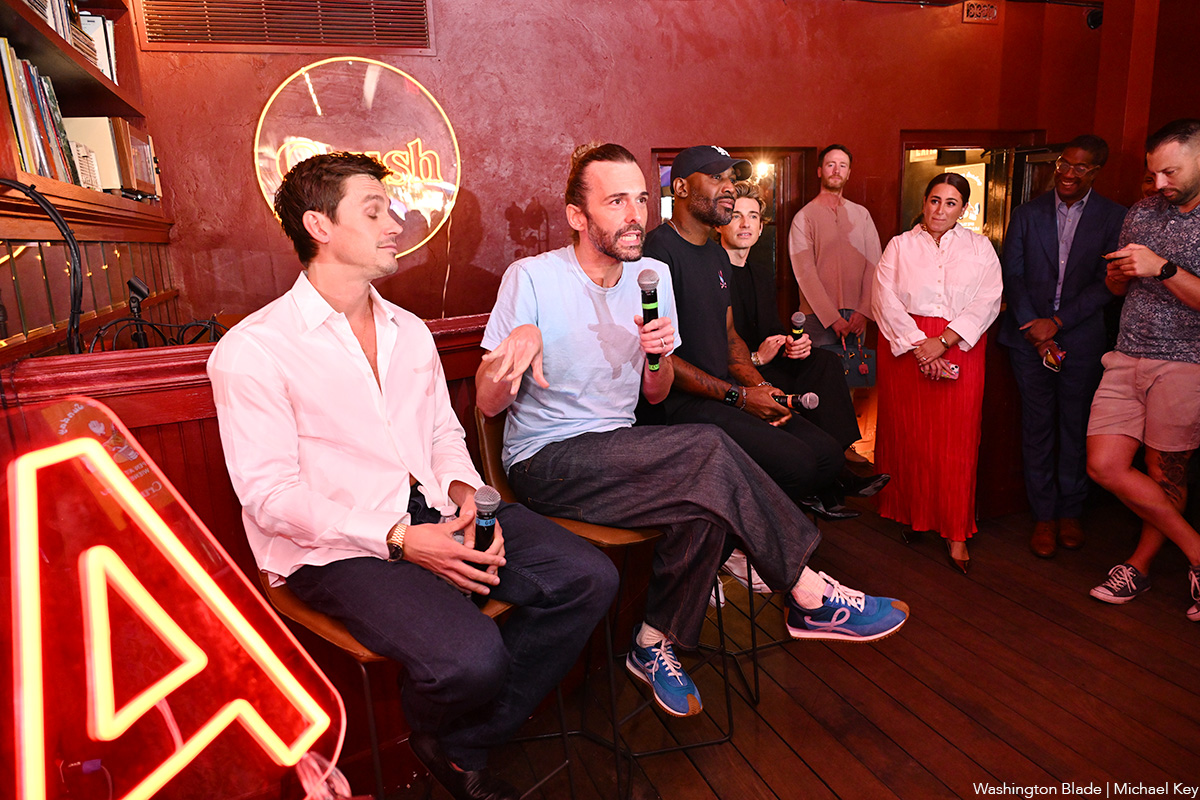
The DC Center is hosting a watch party for an episode of the 10th and final season of “Queer Eye,” which was filmed in D.C. The screening will be held on Friday, Jan. 23 from 5:30-7:30 p.m. at the Center.
The screening will last 45-55 minutes, with community time both before and after the episode. Drinks and snacks will be provided and organizers promise a “surprise or two.” For information on tickets, visit the DC Center’s website.



